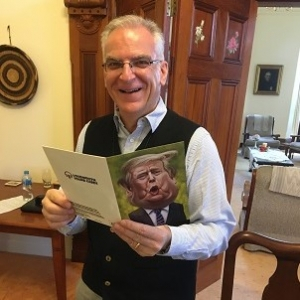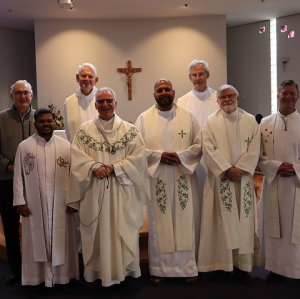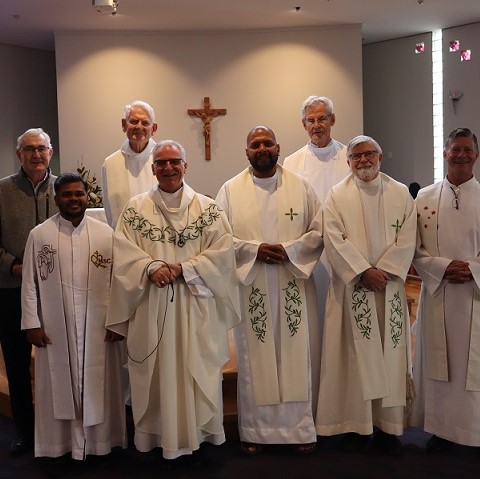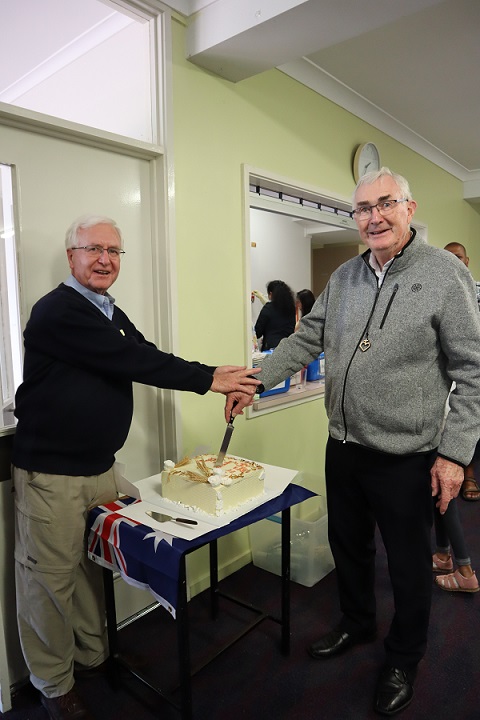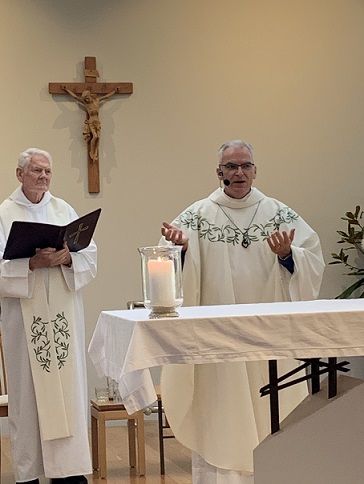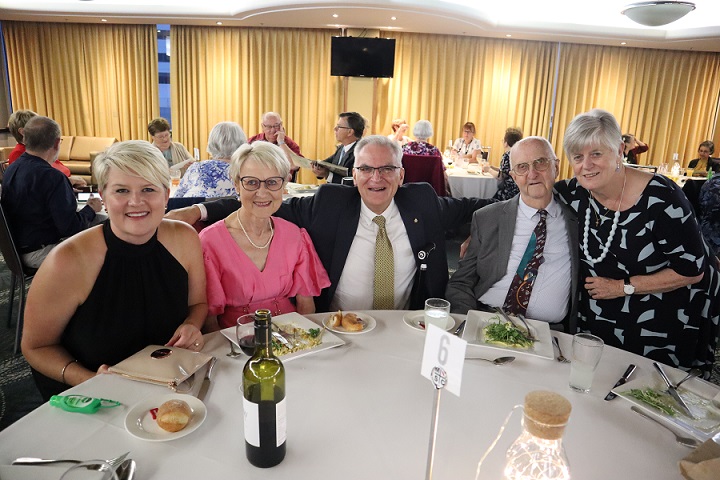Peter MALONE
Congratulations. Chris McPhee MSC, Silver Jubilee of Ordination
Congratulations. Chris McPhee MSC, Silver Jubilee of Ordination
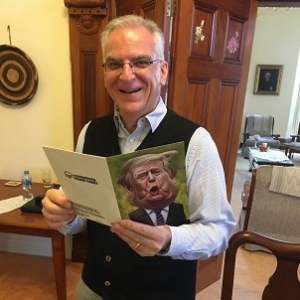
7th March is the 25th anniversary of Chris McPhee’s ordination.
From: Burwood, Melbourne, religious family, Carmelite and Benedictine uncles, sister a Marist Sister
Work: During his 20s in the bank
Formation: Novitiate with Terry Naughton, profession, 19th June 1993

- amazing what one finds in the archives, and what almost three decades will do
Studies: St Paul’s National Seminary, Navarre community, Drummoyne
Ministry: Parishes: Randwick, Kippax, Henley Beach
Studies in Chicago, then Novice Master
Member of the MSC General Council, travelling around the congregation
Australian Provincial Superior, travelling the Province, then lockdown and Zoom
But, free again!
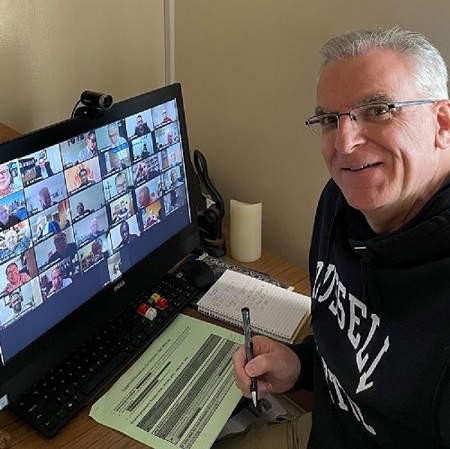
Kippax Parish Celebrates 50 Years
Kippax Parish Celebrates 50 Years
In the introduction of his book on Kippax parish, Jim Littleton MSC wrote:
…St John the Apostle Parish of Kippax is quite remarkable in that it started with nothing other than a rented house, a visionary pastor and many very young families struggling with mortgages and living in an area which until their arrival was just a large sheep paddock….

St John the Apostle Parish has grown into a parish which has amazing vitality, one in which there are many lay-led ministries, a parish of which the parishioners claim ownership, one in which the laity are deeply involved, one in which adult faith formation has been consistently facilitated. The parish has been blessed with several gifted priests who have brought different qualities to their ministry and yet a common thread in the charism of Jules Chevalier, the founder of the Missionaries of the Sacred Heart.
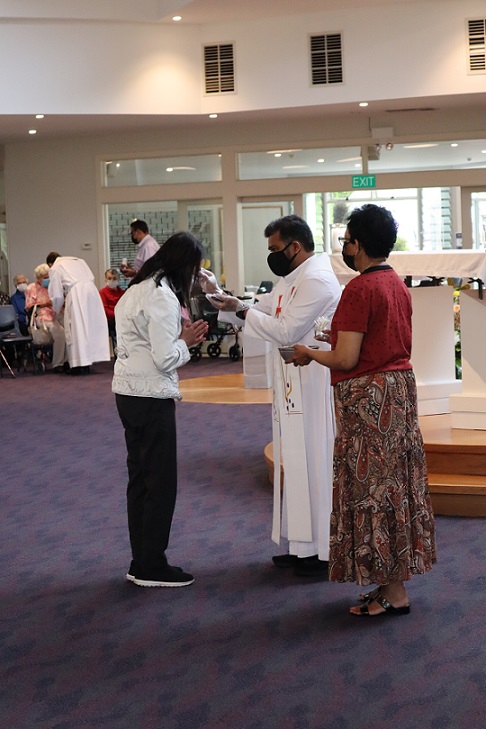
Friday, Fr Michael Stephan and anointing during Mass
The 50th anniversary celebrations began on Friday, 25th February with mass and the sacrament of anointing of the sick. This was an opportunity to celebrate with older parishioners particularly those who were housebound. Arrangements were made to bring those who could to mass, which was followed by lunch, anniversary cake, and a walk down memory lane with parishioners sharing memories of the first ever parish mass at Higgins primary school.
Sunday, Frank Dineen MSC with parishioner, John Drury
Saturday 26th October, Chris McPhee MSC presided at the 50th anniversary mass, with a homily by Michael Fallon. The celebrations continued with dinner at the Belconnen Labour Club which included a few former parishioners who travelled to Canberra for the occasion.
Sunday, a special mass was arranged for 11am celebrating the diverse cultures in the parish. A potluck lunch followed with parishioners encouraged to bring a salad or dessert that reflected their ethnic background.
MSC that joined the anniversary celebration included Chris McPhee, Michael Fallon, Frank Dineen, John Bosman, Stephen Hackett, Gerard McCormick, Mark Hanns, Michael Stephan, and Kimi Vunivesilevu
With thanks to Kimi for the text and the photos of the celebration
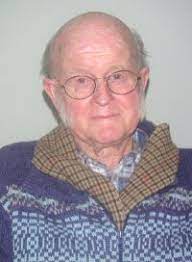
Fr Littleton in his book refers to the founding of the parish and ‘a visionary pastor’ – to Fr Harry Morissey MSC, who published a book on parishes: To Grow a Parish.
Harry Morrissey writes out of his own experience of a variety of pastoral settings in several states throughout Australia. The book takes the basic vision of the Second Vatican Council that the Church is a 'communion'. The author reflects widely on its meaning in today's social circumstances.
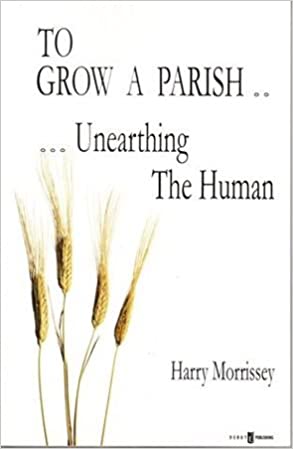
Father's Legacy, A
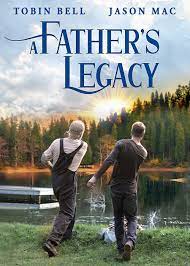
A FATHER'S LEGACY
US, 2020, 90 minutes, Colour.
Tobin Bell, Jason Mac, Rebecca Robles.
Directed by Jason Mac.
To say that this is a home invasion and hostage drama, which is actually true, does not do justice to the film or its themes.
This is a film which is usually categorised as a “faith-film”, produced for an audience of believers and churchgoers, with some hope that it will touch the hearts of those who do not believe. (Which is a difficulty for many audiences who do not share the faith of so many American audiences, automatically put off by any suggestion of explicit religion, the Bible, prayer, and reacting with a kind of passive-aggressive irksome response – which can be gauged by Googling some of the reactions to this film.)
Which, being said, enables a reviewer to talk about the film in itself. While it presupposes a sympathy towards faith and prayer in its audience, it is comparatively reticent in comparison with other films of its kind. There is a Bible. There is a reference to some verses. And, at the end, wonderful use of that most excellent poem-Psalm, The Lord is my Shepherd.
But, the film is also robust, an atmosphere of violence in the opening home invasion sequences and later when some thugs threaten the central character.
The important thing, however, is to focus on the central character, Billy, played with some dignity by Tobin Bell (who is probably best-known to many audiences, and to horror fans, for his role as Jigsaw in the Saw series). Here he is a benign man, older, having served in Vietnam, Silver Star, living alone and isolated. But, as his opening prayer indicates, lifting his eyes to the sky, he is ready for God to take him at any time.
Suddenly, a man with a gun invades his home. The man has been shot, is erratic in his behaviour, abusive, waving his gun, dominating Billy. But Billy tends his wounds, gives him something to eat, does not reveal his presence to the police.
As might be anticipated, most of the film will be the interaction between the two men, the gradual calming of Nick (who eventually reveals his name to Billy), their fishing together, sharing meals, each gradually enabling the other to reveal something of his life, mistakes and failings. And, each of them has a sad story to tell. While Billy tells his story verbally, the screenplay has some quick flashback indications to what has happened with Nick, the robbery, his wife and her pregnancy, faith and prayer, is discussing religion with a minister – negatively.
And, so, the week passes, and the discovery as thugs turn up to threaten Billy, that are property owner in the town wants Billy to sell him his land – with the threat of the thugs burning it down.
There is a dramatic confrontation and quite a dramatic trick in the screenplay which will disturb audiences as they watch it, are apprehensive, but then are calmed.
At times the screenplay is didactic, Billy instructing Nick, metaphors, stones rippling on the water and consequences. But the dialogue also shows the value of deeper conversation, empathetic listening, the encouragement to confession, self-revelation, the desire for forgiveness, some atonement and reconciliation. Which means that the film can be well used by churches, religious groups, discussions with families, younger audiences.
The film also shows that you can’t judge a screenwriter and director by the character of the character they portray on screen. Jason Mac, longtime actor, has written the screenplay, has directed the film, and plays Nick.
A good example of a Faith-film.
- Hostage drama? Home invasion? Shifting tone? Human drama, communication? Truth, confession, reconciliation? A faith drama?
- The South Carolina setting, Billy’s house, isolated, the river? Visits to the town, parking, supermarket? The warehouse and the robbery? The musical score?
- The faith dimension, the references to Scripture, the Psalms, The Lord is my Shepherd, belief in prayer? The loss of faith dimension, Billy and his life, his wife’s Bible, yet his initial openness to God and to finish his life? Nick, contemptuous of God and his wife’s prayer? The end, Bible texts, Nick and prayer?
- The didactic aspect of the film, incorporated into Billy’s character, old, experience, learning from experience, metaphors, stones on water and ripples, instructing Nick, Nick’s initial reactions?
- The opening, Billy, audience response to him, the old man, living alone, 46 years in the house, the gradual revelation of his story, service in Vietnam, the silver star, his marriage, infidelity, his wife unable to have children, Paulette and the birth of his son, immediate disappearance, his regrets, going to his room and writing the letter to his absent son? Work, isolation, making something of his life?
- Nick, the intrusion, waving his gun, home invasion, mouthing threats, erratic behaviour? Billy’s response? The police arriving, questions, Billy seeing them off? Nick and the robbery, the glimpses of his past, at the warehouse, the security guard shooting him, memories of his wife, talking with the minister about faith? Billy tending his wounds? Breakfast? Billy and the hospitality, yet crusty?
- The two men beginning to talk, difficulties with conversation, fishing, the meal, the arrival of the thugs and the threats about burning Billy’s house? Later coming, guns, confrontations with Billy, Nick emerging, the fight, the possibility for his shooting the intruder, taking the wallets and the threat to give their identities to the police?
- The days passing, the two men together, Nick and his healing, memories of his wife, her pregnancy? The emergence of the theme of his father, absence, when Nick was six, unable to comprehend what his father did not choose him? The contrast with Billy, the loss of his son, Nick becoming something of a substitute, Nick’s initial reaction against this?
- The discussions, each telling the truth about the past, sadness, regrets, the sharing? The effect on Nick, Billy and his moralising, didactic stories?
- Nick, the decision to leave, the gun shot, his returning, the dramatic trick of the screenplay showing him shooting, in court, jail, the reaction of his wife? And the audience realising this was imagination? Is not shooting, his motivation?
- Billy’s collapse, hospital, The Lord is my Shepherd, his dying?
- Nick’s return, the visit from the son, the photo, the newspaper article, the son and his search for his father, Nick and his reassurance, giving him the Bible?
- The range of father-son relationships emerging?
- The value of talking and listening, listening as transforming, therapy? And the value of talk, examination of conscience, confession, some absolution, repentance into atonement? Choose to returning the money, the owner and his past difficulties in being forgiven, forgiving Nick, the return to his wife?
Intuition/ La Corazonada
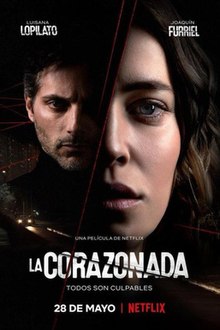
INTUITION/ LA CORAZONADA
Argentina, 2020, 116 minutes, Colour.
Luisana Lopilato, Joauqin Furriel, Rafael Ferro Maite Lanata, Juan Manuel Guilera, Abel Avala, Sebastian Mogordoy.
Directed by Alejandro Montiel.
Intuition is an Argentinian police thriller, very complex in its scenario, several murders and investigation, the interlinking of the crimes, the interlinking of the police work.
The initial focus is on the chief detective, his working on intuition, his rescuing a girl abducted in the forest, but implications of his killing a young man released from prison who had been responsible for the shooting of his wife. He is also suffering from a heart condition, requiring secret medication from a doctor whose son he had rescued from kidnappers in the past. He is a one-man band – although he invites young rookie, Pipa, to join his investigation.
The film focuses also on people (who had been the subject of a previous police investigation film, Perdita, with the same writer and director) – this present film being a prequel.
Pipa is also intense, a loner, rather humourless in her dedication. She is asked by the police chief, who is being blackmailed because of compromising photos, to spy on her partner, finding evidence that he is innocent, then finding evidence that seems he is guilty. They are also involved in the investigation of a murder of a young woman, suspicions on her friend, suspicions also on a young man who is a stalker but who has severe mental conditions.
Ultimately, there is confrontation, the revelation of the truth, the mother-in-law of the detective being responsible for the killing of the young man – and Pipa speculating, following the leads, finding the incriminating car.
For audiences who enjoyed police investigations, thrillers and mysteries – although some commentators have found the film far too complicated.
- Police thriller, investigation, crime, corruption?
- Argentinian police thriller, atmosphere, the city’s, misters, the streets, the precincts and offices, on the road, homes, hospitals, atmosphere? The musical score?
- The complexity of the plot, the range of police, the different crimes, the interconnections?
- The opening, the man on the bike, his being run down? His background, the flashback to his shooting Juanez wife, two years in jail, release, his being killed? His brother, wanting vengeance? Juanez, his motivation?
- The case of the serial killer, the police, the intensity of the search in the woods, finding the dead girl? Juanez persevering, finding the girl alive? The killer and his death?
- The further murder, Gloriana, the police called? Juanez late, the audience seeing him go to the hospital, his heart condition, the doctor, the doctor’s later explanation of his indebtedness with Juanez finding his son, the treatment? The footage of his arriving in the car? Confirming his innocence by being with the doctor? His guilt with the evidence of the car?
- Pipa, the rookie, with her companion, the search for the missing girl? Juanez and his promoting her? Her skills, police work, intensity, the loner, serious? Roger, asking her to shadow Juanez, her getting the evidence, interviewing the doctor? Her suspicions about Juanez, believing him, and the later change of heart with the evidence of the car? The night together? The man in the institution, stalking Minerva, Pipa going to the house, Minerva stabbing the young man? The interrogations? Juanez and his suspicions, the evidence of the whole, Minerva’s confession, lying, right-hand and left-hand, the young man moving the dead woman’s body, the flashbacks to the truth? Her guilt? The support of her mother?
- Roger, his being blackmailed, the compromising photos, his relationship with Juanez, wanting people to keep surveillance, his contact with Zorro, Zorro and the muggings, Fito and his work with people are, the USB stick, mugged?
- The buildup to the confrontation, Roger organising Juanez to be killed, Juanez ahead of them, his deputy and sniper position, the confrontation with Pipa, his asking her to listen, the confrontation with Zorro, deaths, the deputy killed, Juanez and his heart condition?
- Pipa, observing Juanez with his mother-in-law, suspicions, her house, discovering the car? That she had killed the man who shot her daughter? That Juanez had covered and driven the car to the hospital?
- Pipa, passing the mother-in-law in the street, the resolution of the crimes? Her future?
Friends and Strangers
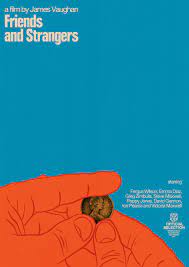
FRIENDS AND STRANGERS
Australia, 2021, 82 minutes, Colour.
Fergus Wilson, Emma Diaz, Greg Zimbalist, Malcolm Kennard.
Directed by James Vaughan.
This is the kind of film that challenges a reviewer, who wants to mediate the experience of the film to potential viewers, but offers great scope for a critic, to analyse the film, techniques, content, cinema references…
And this is what has happened here. Friends and Strangers was very well received by critics, with comments like the following: Part absurdist comedy, part satire of colonial accidie, the film follows directionless twenty-somethings Ray and Alice as they navigate a series of prosaic but increasingly agonising situations.
And, in many ways, this is what the film is – although Alice disappears rather early in the film and the focus is on Ray, a series of encounters and meanderings. He is not the most proactive of film heroes.
And, one critic commented on the films of French director, Eric Rohmer, with his focus on individuals in their context, meaning of life, many of relationships – and suggested that Friends and Strangers is an Australian film in that vein. There are long takes of some very attractive scenery and locations, a lake in the country, vistas of Sydney CBD, the harbour at harbourside mentions (and, starting from the credits and with verbal references to the history of Sydney, 1788, the early settlement, flora and fauna…).
On the other hand, one blogger’s reaction to the film was – and here is an interesting word – a discombobulation of episodes.
Ray and Alice meet by chance, decide to go camping together, encounter and an old codger who warns that they should move on, a meeting with a young girl who is on a trip around Australia with her widower father who is home educating her – and a conversation about Australian art and culture, and a connection with the artist Boyd family. Ray then meets a friend who will work with him on videoing a marriage ceremony, a long sequence in a car, the camera inside and at the back of driver and passenger (and, probably, some will reference the films of Iranian, Abbas Kierostami, inside cars – as has been referenced here!). This is a rather long sequence and, for the impatient viewer, it does get a bit exciting when smoke emerges from the engine.
There is also an encounter with an eccentric neighbour who plays loud atonal music and the arrival at the home of the family, filled with art, which is to be the venue of the wedding – and long, eccentric conversations about art and neighbours – and Ray’s mother coming to his rescue as the film ends.
So, for audiences (most?) who are eager for a story, for some kind of narrative which will interest them and, perhaps challenge them, this will not make the top of their list. On the other hand, critics who admire cinematic experiments (and some have described Friends and Strangers in this way), it will be an arthouse must see. And then we find this information: Ranking in BFI’s Sight & Sound’s Top 50 Films of 2021, James Vaughan’s debut feature, Friends and Strangers explores displacement and disconnection in contemporary Australia.
Sans Repit/ Restless
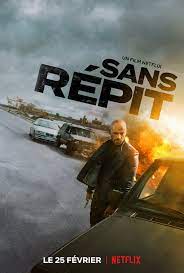
SANS REPIT/RESTLESS
France, 2021, 96 minutes, Colour.
Franck Gastambide, Simon Abkarian, Michael Abiteboul.
Directed by Regis Blondeau.
Here is an exciting and quickly paced French police drama. But, it is not just about investigations, the main interest is in police corruption, taking money from drug deals, and police finding that they are in further than they ever dreamt, more extensive police corruption.
The title of the film in English, Restless, seem something of an understatement with the French phrase being translated as “without let up”. That seems a far better description of what happens. The film itself is a French version of an original Korean film, A Hard Day, the same plot and characters (but the Korean film running 15 minutes longer than the French version).
While the film has fast paced action, taking place, more or less, over 36 hours, it is also a character study of the central character. He is Thomas, a reputable police officer in a provincial city, divorced, devoted to his young daughter. And his mother has just died and he is taking care of her funeral with his sister. He is played very effectively by Franck Gastambide (and, with his bald pate, and his facial features, he strongly resembles Vin Diesel who might be ideal if there were to be an American remake!).
At the opening, Thomas is driving his car, under strong pressure, being warned that internal affairs are coming to inspect his locker and question his associates about money on drugs. He is also driving to the hospital, the mortuary room where his mother is resting and the lid is about to be put on her casket. A dog on the road and he swerve. A further swerve and a dead body – and a life changing decision, self-protective, in retrospect, foolish. He puts the dead body in his car, and, rather ingeniously but testing credibility, in a sequence worth watching, he is able to infiltrate the corpse into the mortuary room and put it in his mother’s coffin.
There is a mystery of who is the dead man and its revelation, Thomas examining the building where he came from and finding information about a security locker.
But, then come mysterious phone calls and the mysterious identity of who is behind the crisis, the man who is wanting the body (and the key to the security box).
This is the moment where anything further might be construed as spoilers. There is quite some action, some surprising developments, and, of course, the dangers Thomas as he confronts the arch-villain (who has absolutely no redeeming features) and a moral decision at the end – the kind of moral decision at the end of the film which has the audience wondering what they would do in Thomas’s place.
A reminder that the French can do police action thrillers well.
- Strong police drama? French style? Police, corruption, drug dealing, money? Cover-ups? Connected with personal drama of death, family?
- The setting, the French town, streets, police precincts, headquarters, guns and equipment, contrasting with hospitals, mortuary? The musical score, increasing the film’s pace?
- The introduction to Thomas, his role with the police, Marc is his friend and godfather of his daughter, working together, Naomi and her training, assistance, the chief of the department? His initial bewilderment, his being called into action, the internal affairs investigation? His mother’s death, deadline for putting the lid on the coffin, contact with his daughter, her wanting a toy? His sister?
- The context for his being anxious, his driving, the dog on the road and avoiding it, swerving, the dead body on the road? His dilemmas? His option for putting the body in the boot of his car? No turning back?
- The mortuary, his arrival, sister and daughter, his mother laid out, the crucifix to be put in the coffin? Hammering the screws on the coffin, his asking for more time to be with his mother? The deadline of 10 o’clock, his getting the body, putting it in the vent, his daughter’s toy soldier and the ropes, the battery? Back inside the room, the balloons covering the surveillance cameras, opening the vent, the effort in using the soldier (firing bullets) and drawing the body into the room? The nurses hearing noises, suspicious, checking with security, rules and regulations? Getting the body, putting it in his mother’s coffin, sealing the coffin again, the irony of the mobile phone ringing? Finishing in time, the mortuary director returning?
- Marc and Naomi, going to Thomas’s locker, finding the money, flushing it down the toilet? Internal affairs not finding anything? Marc, his confronting Thomas, Marc’s wife and her dependency, Thomas and the expenses for his mother’s illness and burial? Tension between the two? Marc later coming in the car, wanting to give up the drug, Thomas giving him the key to the box with the police chief’s cash? And the horror of the dropping of the load on the car and killing Marc?
- Thomas, the anonymous phone calls, the pressure on him, the caller wanting the body? Defying the dead man, tracking down his accomplice in drug deals, getting the information at the laundromat? Getting the documents and the code for the money in the security box?
- The revelation that the phone call was the head of narcotics, his arrival, threats, sense of menace? The overview of his success with the nightclubs, the money deals with drugs, mixing with alcohol, the dependencies?
- Thomas, the meetings with the chief of narcotics, the promise to give the body, his digging up his mother’s grave? Bringing the body, but finding the key in keeping it?
- Thomas’s reaction with Marc’s death, the narcotics chief threatening his sister and daughter, his getting them away from the city?
- The background of guns and equipment at the police precinct, his getting the gun, the blanks, the explosives? The set up, putting the explosives in the body? The confrontation with the narcotics chief, the gun, firing blanks, the chief driving away, the explosion? But his surviving, pursuing Thomas, fighting with him, the rounds in the gun, empty chamber, the final shot? Their falling into the water?
- Thomas, his decisions, standing at the water, Naomi coming to meet him, giving him the key that was found in the car? Decisions about the money?
- Going to the security boxes, opening, the vast amount of cash?
- The police officials and the decision for cover-up?
- And the ending of the film – and audiences wondering what Thomas would do (what they would do)?
Tahara
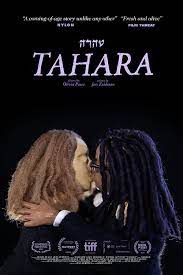
TAHARA
US, 2020, 78 minutes, Colour.
Madeline Grey De Freece, Rachel Sennot, Daniel Taveras.
Directed by Olivia Peace.
The title refers to some of the rituals for burial in the Jewish tradition.
The burial at the centre of this film is that of a teenage student who has killed herself. The action takes place at the ceremony and at a class on rituals afterwards.
At the centre of this film, brief, to fellow students. There is a focus on Carrie, rather reserved, but best friends with Hannah. The two are played by – and a reminder that at the same time Rebecca played the precocious young woman, also at funeral ritual, Shiva Baby.
Most of the film is conversation. In fact, it is girl-chat, girl-gossip. Carrey is tentative in her relationships, discovering her sexuality and sexual orientation, attracted towards Hannah but also finding her very difficult. Hannah, on the other hand, is out there, chatting all during the ritual, looking about in making comment on those present, imagining that the young man is attracted to her when he isn’t, she rather flaunting herself. She is self-centred, self-preoccupied, prone to literal pratfalls as well as conversation gaps.
Besides the girl chat, there is also some boy-chat between the young man and Hannah, Hannah making a fool of herself, the young man bewildered.
A lot of the chat is about identity, sexuality, relationships, self-discovery.
A film for its target audience, the age of its characters. Other audiences might lose interest.
Studio 666
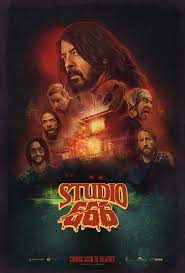
STUDIO 666
US, 2022, 106 minutes, Colour.
Foo Fighters: Dave Grohl, Nate Mendel, Pat Smear, Chris Shiflett, Taylor Hawkins, Rami Jaffee, Whitney Cummings, Will Forte, Jeff Garlin, Jenna Ortega.
Directed by B.J.McDonnell.
This reviewer is indebted to a blogger for a succinct review: gory and goofy.
The main reason for seeing this film is to see Dave Grohl, larger-than-life, Kurt Cobain’s former drummer and founder of the rock group, Foo Fighters. It is an opportunity to see him and the whole group with their musical talent, plenty of opportunity. And, each of them, is able to display their prowess and finesse.
But, Foo Fighters fans may not be definite A’s of grisly horror films. But, that is what this Juanez, some gory touches at the opening to set a tone but after the music comes all kinds of gristle and Gore, demonic appearances, and the most graphic and macabre slayings. (For those not into this kind of horror they, maybe, will have to close their eyes and listen to the music!)
The screenplay is based on an idea by Dave Grohl which could be interpreted as self-promotion. However, he is a genial presence, larger-than-life, able to send himself up. And, at times, he plays the guitar as if possessed (and, according to the plot, he is!).
To brighten the proceedings there are some guest spots, Will Forte is an unfortunate would be musician who is a pizza deliverer. Then Dave Grohl has a dream singing Hello and who should enter into his dream but Lionel Richie himself! Jeff Garlin is the manager, money-preoccupied, but also in league with the devil.
In many ways, this is a typical be film which might hope one day to be a cult film (and probably will be given the reputation of the Foo Fighters). It is B budget – especially with some of the effects for the bizarre Demons. And, the individual Foo Fighters are given a lot to do and say in the drama of the narrative, about their work, their personalities, and becoming more and more involved in the bizarre goings on in the country estate where the audience knows there has been a massacre in the 1990s and that the Foo Fighters had walked into a trap.
It may have been a condition in the contracts for the Foo Fighters that they are not required to act. Acting is definitely not their forte.
For Dave Grohl fans and the music of the Foo Fighters if they can live with the gory horror (and the non-acting).
Stitch in Time, A/ Australia
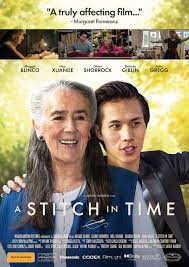
A STITCH IN TIME
Australia, 2022, 98 minutes, Colour.
Maggie Blinco, Glenn Shorrock, Belinda Giblin,Hoa Xuande.
Directed by Sasha Hadden.
In fact, the title does not appear until the end credits – which means that we may be wondering, all the way through, what it actually means. The central character, Liebe, is a talented seamstress, making dresses in the past, deciding in her later age to branch out again, a stitch in time to give her new life. However, she has spent 50 years in partnership with a musician, Duncan (played by musician and singer, Glenn Shorrock of the Little River Band), ambitious for his music but disappointed in his partner pulling out decades earlier, leaving him floundering, and taking out his disappointments on Liebe.
Liebe is played by Maggie Blinco, a career highlight for her after 50 years in film and television. She explains her story, one of the Kindertransport, war children transported by train from Germany to Britain, Jewish but brought up as Christian. She has had to be a patient woman most of her life, supporting Duncan. But, he is angry, bitter, even vengeful on Liebe, fired from his job, making contact with the musician who walked out on him, Justin (John Greg), resentful of his wife, Christine (Belinda Giblin).
In the meantime, Liebe wanders the market stalls outside the church in Balmain, where much of the action was filmed. She encounters the stall of a fashion designer, young Chinese man, Hamish (!) And becomes friends with him, his supporting her work, her going to his stall to sell her dresses, initially slow, then some customer attention.
The screenplay has a women’s liberation theme, Liebe’s liberation from patriarchal presuppositions about her place, in the kitchen, at home, subservient to the husband. She gets a new lease of life, initially helped by Christine who is wealthy, but experiencing some of the same patriarchal dominance from her husband. There is a crisis, some unhappy memories of the past, Liebe walking out to find her own life, fortunately helped by Hamish and his Australian wife.
Which leads her to a new phase, renting garage space from a group of Chinese students, working continuously, making new clothes, becoming more successful – and this, especially, with advertising online and her getting many followers. Hamish helps but he also relies on Lieber for drawing up patterns (though she does not quite approve of his more modern styles of dress design).
Given her background from World War II, Liebe does believe in forgiveness but finds it very hard – but, that is the expected conclusion from a story like this, her finding possibilities for some kind of forgiveness, understanding and a surprising way of encouraging Duncan to record one of his songs (the wonders of social media!).
A film that will resonate with older audiences, especially women who will identify in many ways with Liebe.
- The title, Liebe Is a dressmaker, the past, taking up dressmaking again, experiences, exhilaration, future?
- The Sydney settings, the inner city suburbs, homes, RSL club, church, markets and stalls? The affluent country house and interiors? The Chinese students, flats and garage? The musical score?
- Liebe’s story, the past, her love for Duncan, with him for 50 years, his infidelities, her staying with him? Her dressmaking and skills? The sewing machine and the noise? Faithfully listening to Duncan, at the RSL, going home, his tantrums? Preparing his meals, his diet? Her becoming more exasperated? The past history with Christine, the separation from Justin and Christine, Duncan’s phone call, the visit, Liebe happy to see Christine again? Her encouragement? Duncan’s tantrums against Justin? Just concerning reasonable?
- Liebe at the church, the market, Hamish and his stall, the conversations, her taking up the dressmaking, going to buy the fabrics, the discounts, her loving care, cutting and measuring the material? Getting out the dress she made for Christine and taking it for Christine?
- Duncan, character, musician, composer, his career, the grudge of many years against Justin? His past, relationship with Christine? Cantankerous, health, demanding on Liebe?
- Liebe leaving him, going to Christine, the accommodation, sewing, Justin and his negative reactions, Christine and companionship, buying the new sewing machine?
- Liebe, her diligence, making the dresses, wanting to support herself, going to Hamish, at the stall, giving away the Address and the later gratitude from the young woman, gradually getting customers, buying more material, making more dresses?
- Hamish, his wife, fashion design, the stall, customers, kindly towards Liebe, her selling the dresses, his encouragement, his wanting her to make patterns for him, the disagreements about the style of the dress? His getting her the accommodation in the garage? Bringing the new cutting board? The Chinese students?
- Duncan, arrival, challenge to Justin, revelation about Christine, Liebe upset, leaving, the accommodation, the garage, making the dresses, not eating sufficiently, collapsing, on the park bench, Hamish finding her? The food, her cooking for the students, the bonding?
- Christine, her visit, moments of forgiveness?
- Duncan, illness, her going to the hospital, not coming back to him, feeding him? His desire to make more music? Social media, the young man and the recording, its being played on You Tube?
- Liebe, age, that the possibilities for a new lease of life?
Flee
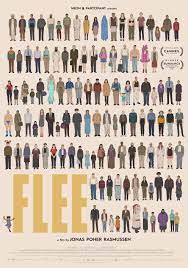
FLEE
Denmark, 2021, 89 minutes, Colour.
A film about refugees from Afghanistan, its release made more poignant by the collapse of Kabul and the taking over the country by the Taliban in 2021.
This is a striking film, Oscar-nominated in three categories: Best Documentary, Best Animation, Best Foreign Language Film. And it has won quite a number of nominations and awards in festivals.
But the refugee at the centre of the story, Amin, takes us back to 1984, some seemingly ordinary life in the capital, an amount of freedom. However, the monarchy has been previously toppled, the Mujahadin are exercising power, there is the Communist influence. Amin’s father is arrested, imprisoned, disappeared. His family suffer oppression, an older brother drafted to the military but escaping, the family relying on help to escape to Moscow. By the mid-90s, after years in Moscow, Amin leaves Russia, with the help of a refugee trafficker, a teenager finding that instead of going to Sweden to meet with his brother and family, he is sent to Denmark, having to keep quiet about his identity, a fabricated story about the death of the rest of his family, something that he conceals for many years.
While we might say that this is a familiar enough story, repeated over the decades and relevant to 2021, it is the way that the story is told that continually demands our attention, keeps us fascinated.
While there is a voice-over from Amin, narrating his story throughout the film, the visual method used is that of animation. The style is direct and broad, bringing to life the many episodes in Amin’s life, as a little boy (prone to wear his sister’s dresses), playing in the streets, his home life, the older sister telling heroic stories about their father, then the arrest, imprisonment, oppression and fear, the effect on the mother and her going prematurely grey.
This animation device means that we probably pay more attention to Amin and his story than we might have in a direct biographical documentary. The narrative has its moments of pain, uncertainty, relief.
Intercut with Amin telling his story is the revelation that until now, even with friends and his partner, he has not revealed the truth, that his family are still alive. The director has him lie down on the carpet, interviews him like a psychologist, eliciting more and more truth from Amin.
We also learn that Amin has had a successful life, an academic career, time in the United States. He also reveals his sexual orientation, his uncertainties, the grim view of homosexuality in Afghan society, the family accepting him as he was. And, there is relationship with his partner, the buying a house, settling down, moving in, a wedding ceremony.
The animation is made all the more effective because of the wide range of newsreel and television footage inserted, bringing a heightened sense of reality to situations in Afghanistan, war, suffering and escape.
A moving story inviting audiences to be more understanding and sympathetic to refugees and appreciate what they have experienced and suffered.
- Title, the direct? Refugees? The history of Afghanistan in the late 20th century? 21st-century?
- A biographical portrait, Amin and his voice-over, telling his story? The use of animation, style, characters, situations? Bold and direct? Colour? The insertion of newsreel footage, making a highlighted contrast with the animation? Overall impact?
- Amin, his relationship with the director, the interviews, discussions, Amin and gradual self-rvelation, when he was ready? His lying on the carpet, the director like a psychologist? Telling his story as therapy?
- Amin as an adult, life in Denmark, studies, his career, the United States? Relationships, his sexual orientation, his partner, separations, the buying of the house, setting it up, settling down, the marriage?
- Kabul, 1984, memories of family life, parents, brothers and sisters, the older sister and the heroic stories of her pilot father, Amin and his wearing the dress and this being taken for granted, bond with his brother? His mother? The change of government, the Mujahadeen, the father taken, imprisoned, disappearing? The consequences for the family? His brother in the military service, escaping?
- The political orientation of the government, the family and their fleeing to Moscow, the years in Moscow, concealed? Amin growing up? His mother and her grey hair? The possibilities for getting out of Russia?
- The people smugglers, the deals, money, the decisions about who should escape? The older brother and his family in Sweden? The decision for Amin to go?
- The trafficking, the smuggler and his demands, creating the story, no family? The two boys and their travelling, Amin reflecting on the attraction to the young man, in the truck, the planes, Amin going to Copenhagen, in the airport, refugee status, telling his orphans story, his being accepted? Eventually ringing his brother?
- Amin and his life in Denmark, fearful of being picked up and deported, staying to his story, no revelations?
- The visit to his brother, the pestering about having a girlfriend, his confession to the family, his brother taking him to the club, the background of homosexuality in Afghanistan, no name, not talked about, disgrace?
- The passing of the years, the discussions with the film director, the decision to make the film?
- Portrait of Amin, portrait of a refugee, the past in Afghanistan, freedom in Western Europe?
